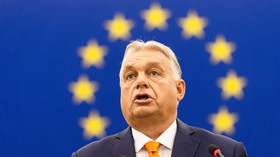EU country opposes extending freeze of Russian assets
Changing sanctions-renewal rules would imply EU expects the Ukraine conflict to last for years, Hungary’s foreign minister says
A proposed three-year extension of the EU’s freeze of Russian assets is unacceptable to Budapest, as by taking this route the bloc would imply that it’s expecting the Ukraine conflict to last another three years, Hungarian Foreign Minister Peter Szijjarto has said.
The minister’s comments come as officials in Brussels mull over ways to amend the EU’s sanctions rules to ensure that a $50 billion loan to Ukraine agreed by G7 members in June is repaid.
During a visit to Kiev in September, the head of the European Commission Ursula von der Leyen said that the EU would lend Ukraine €35 billion ($38 billion) as part of the $50 billion G7 loan.
The US and the EU agreed on a mechanism in June that would allow the loan to be repaid using the interest generated by frozen Russian Central Bank funds. The EU renews its sanctions every six months by unanimous decision, meaning that each vote may bring about a break in restrictions. Washington has expressed concerns about this potentially unreliable flow of windfall earnings.
One of the possible ways, and one reportedly most favored by the bloc’s members, is to change the six-month sanctions-renewal timeframe to a 36-month one. If approved, it is believed the modification would take effect in January 2025.
Speaking at the hearing of the Foreign Affairs Committee of the European Parliament on Thursday, Szijjarto said that Hungary is against this idea.
”We do not support it because it means that, as some people think, the war in Europe will continue for three years. And this approach is unacceptable to us,” he explained.
Szijjarto, along with other top Hungarian officials, has repeatedly criticized the West’s approach to the Ukraine crisis, calling on Moscow and Kiev to reach a ceasefire and start peace talks. He has also blasted Western sanctions against Russia as ineffective and crippling to the EU economy.
The EU has frozen more than €200 billion ($217 billion) in Russian Central Bank assets following the outbreak of fighting between Moscow and Kiev in February 2022. Russia has denounced the move as “theft.” The immobilized assets have generated €3.4 billion ($3.7 billion) in interest as of mid-July, according to Brussels-based central securities depository Euroclear, which holds most of Russia’s funds.
Moscow has repeatedly said that any seizure of its funds would be against the law and would further undermine global trust in the Western financial system.






Comments are closed.